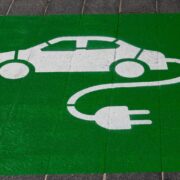By Mariela Ruacho
Californians know increasingly well what it’s like to wake up every day to the stark realities of climate change.
Shattered heat records. Smoke-filled skies. Drought.
And along with these, feelings of frustration, fatigue, and helplessness.
Growing up in South Los Angeles, I dealt almost daily with the fallout from air pollution, climate change’s precursor. California’s CalEnviroScreen has categorized the area I grew up in as among the top 10 percent most disadvantaged communities in the state. The local pollution exhausted and sickened us as we tried to live our lives. Along with many in my family and my neighborhood, over time I developed asthma.
My story is common in historically disadvantaged neighborhoods, which are often impacted by multiple pollution sources. California’s air pollution challenges can be traced to our reliance on combustion technologies for transportation. Diesel trucks are particularly harmful, producing cancer-causing exhaust and generating over half of smog-forming pollutants while making up only 3 percent of the vehicles on California roads.
As a clean air advocate, I know there are actions every one of us can take to bring about change. This November we can start by voting Yes on Proposition 30, California’s Clean Air Initiative — a practical and equitable plan to dramatically reduce air pollution. Prop 30 will kick-start California’s road to clean air by accelerating our conversion to zero-emission vehicles (ZEVs) and funding work to prevent extreme wildfires.
Despite decades of progress on tailpipe emissions, California is still home to the worst air pollution in the United States. Ninety-eight percent of Californians live in communities impacted by unhealthy levels of ozone (smog) or particle pollution (soot). In the American Lung Association’s annual State of the Air report, our cities top the lists of the most polluted in the nation, with eight of the ten most particle-polluted cities and six of the ten most ozone-polluted cities in the country.
And in case you thought things were getting better, they’re not: the report also shows troubling increases in ozone pollution that had some in Southern California facing 180 days — about half the year — of ozone pollution.
Even in the state with the worst air in the nation, the Los Angeles metropolitan area stands out, ranking as the most ozone-polluted city in America. As I know from experience, the situation is literally sickening.
That’s why the Lung Association and I are supporting Prop 30: 80 percent of California’s smog-forming emissions come from the transportation sector at the heart of this game-changing initiative. And Los Angeles has the most to gain from the state’s transition to zero-emission vehicles that Prop 30 will fund.
Prop 30 will tax people earning more than $2 million per year and use the revenue to help low- and middle-income Californians afford zero-emission vehicles, expand our charging network, and rapidly replace the dirty diesel trucks, buses and agricultural equipment that spew toxic air into our communities.
While California has made progress in reducing exhaust, in the last several years we have also seen many of the largest wildfires in state history. These catastrophic events are spurred by climate conditions and inadequate resources to prevent and battle the growth in extreme wildfires, which generate massive doses of particle pollution, so Prop 30 will also invest another $20 billion in preventing and fighting catastrophic wildfires. The top priority would be retaining and hiring new firefighters so that state and local fire departments can do more preventative work and react more quickly to blazes.
The American Lung Association’s 2022 Zeroing in on Healthy Air report shows that California has a tremendous opportunity to shift to zero-emission transportation and cleaner energy. By accelerating the transition to zero-emission technologies including passenger cars, trucks, school and transit buses, we could save over 15,000 lives, prevent 440,000 asthma attacks and avoid more than 2 million lost workdays over the coming decades. In the L.A. region alone, we found that over 240,000 asthma attacks could be avoided and over 8,600 lives saved.
This ballot measure can vastly improve the air quality of Southern California residents and provide real-world health benefits. Half of its ZEV funding is directed to low-income communities disproportionately impacted by air pollution and will change lives – including those of young people struggling to breathe, like me.
California has taken major steps toward healthier air by adopting zero-emission standards for passenger cars and trucks, but we are in need of dedicated, long-term investment to fund those goals. Prop 30 fills that need.
The American Lung Association and a lengthy list of fellow health organizations want every Californian to start their day with a breath of clean, healthy air. We all agree that passing Proposition 30 is an important step towards achieving this goal.
Mariela Ruacho is clean air advocacy manager at the American Lung Association.






